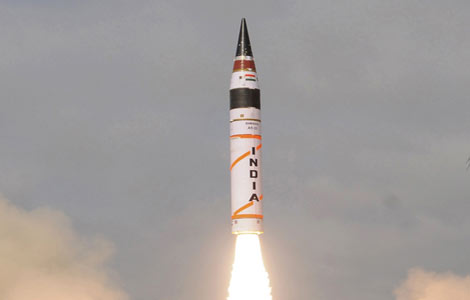Missile test puts China in range
Updated: 2012-04-20 08:05
By Cui Haipei (China Daily)
|
||||||||
|
 A long-range missile blasts off from a site off India's east coast on Thursday. The launch means that India joins an elite club with intercontinental missile capabilities. Provided to China Daily |
India announced the successful test launch on Thursday of a nuclear-capable missile that would give it for the first time the ability to strike major Chinese cities, such as Beijing.
The Agni-V missile, which has a range of 5,000 kilometers, was hailed by India after the successful launch as a major boost to the nation's efforts to counter China's regional dominance and become a respected world power in its own right.
"The nation stands tall today," Indian Defense Minister A.K. Antony said.
The launch shows that India is making concrete efforts to support its ambition to become a world power, said Su Hao, director of the center for strategic and conflict management at China Foreign Affairs University. Su emphasized that India has finally acquired the third part of strategic strike forces after acquiring nuclear weapons and an aircraft carrier.
"Compared with conventional weapons, nuclear weapons and strategic long-range missiles serve more as deterrents, but they are necessary for a global power," Su said, adding that India has become the largest military spender - $127 billion in the past five years.
But he also said that the missile might not trigger a regional arms race.
China downplayed the missile launch on Thursday, saying the two neighboring nations are not rivals.
"China has taken note of reports of India's missile launch," Foreign Ministry spokesman Liu Weimin said at a regular news briefing.
"China and India are both big emerging economies. We are not rivals, but partners," he said. "Both should cherish this peaceful situation and increase strategic cooperation to safeguard regional peace and stability."
Despite the history of confrontation between India and Pakistan, Su said Pakistan is unlikely to react strongly because India has already established its capability to strike anywhere inside that nation.
The test came just days after a failed rocket launch in the Democratic People's Republic of Korea. Since the timing was sensitive, Su said the reason the Agni-V missile sparked little global condemnation is that some Western countries have encouraged India to contain China through such actions.
Video released by India showed the Agni-V lifting off from a small launcher on what appeared to be railroad tracks at 8:07 am from Wheeler Island off India's east coast.
The missile's three stages worked properly and its payload was deployed as planned, said Vijay Saraswat, the head of India's Defense Research and Development Organization.
"India has today become a nation with the capability to develop, produce, and build long-range ballistic missiles, and today we are among the six countries who have this capability," Saraswat said.
Analysts say France, Russia, China and the United States have this technology, while Israel is also believed to have developed such missiles.
Yao Yunzhu, a senior researcher at the Academy of Military Science of the People's Liberation Army, doubted the reported range of Agni-V missile, and said the missile will not upset the current military balance between China and India because India already has the Agni-III with a range of 3,500 km.
"I don't think the new missile is a significant breakthrough for India. It's just an improvement on the range, and will not change the current military strength contrast between the two countries," she said, adding that when India thinks on a strategic level which country is the real enemy, "it should absolutely not be China".
AP contributed to this story.
cuihaipei@chinadaily.com.cn

 Relief reaches isolated village
Relief reaches isolated village
 Rainfall poses new threats to quake-hit region
Rainfall poses new threats to quake-hit region
 Funerals begin for Boston bombing victims
Funerals begin for Boston bombing victims
 Quake takeaway from China's Air Force
Quake takeaway from China's Air Force
 Obama celebrates young inventors at science fair
Obama celebrates young inventors at science fair
 Earth Day marked around the world
Earth Day marked around the world
 Volunteer team helping students find sense of normalcy
Volunteer team helping students find sense of normalcy
 Ethnic groups quick to join rescue efforts
Ethnic groups quick to join rescue efforts
Most Viewed
Editor's Picks

|

|

|

|

|

|
Today's Top News
Health new priority for quake zone
Xi meets US top military officer
Japan's boats driven out of Diaoyu
China mulls online shopping legislation
Bird flu death toll rises to 22
Putin appoints new ambassador to China
Japanese ships blocked from Diaoyu Islands
Inspired by Guan, more Chinese pick up golf
US Weekly

|

|






